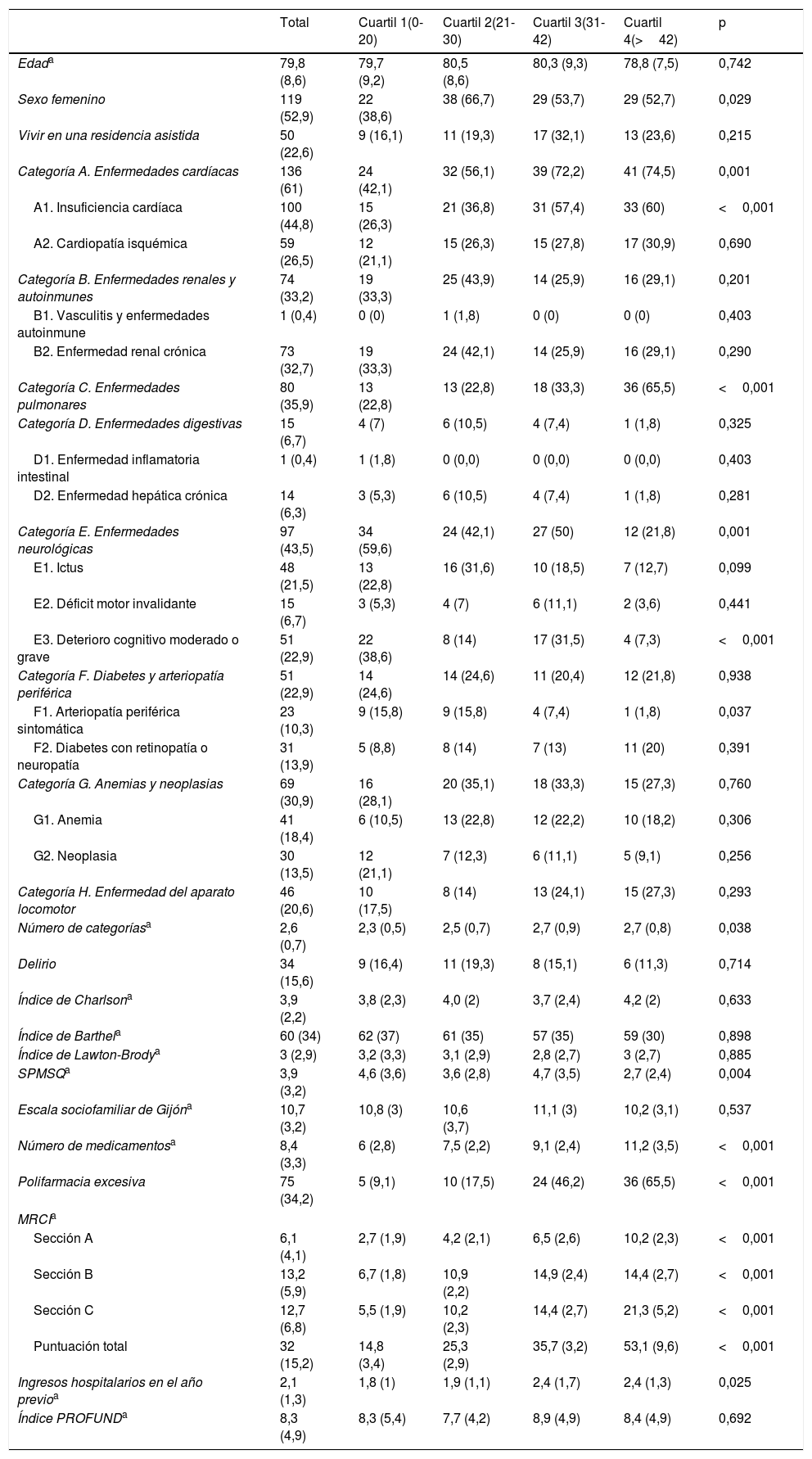Determinar si un régimen medicamentoso más simple en pacientes pluripatológicos se asocia con la supervivencia.
MétodosEn un estudio de cohortes multicéntrico se incluyeron pacientes pluripatológicos hospitalizados en servicios de medicina interna entre el 1 de marzo y el 30 de junio de 2011. Se excluyeron los reingresos y los fallecidos. Se recogieron datos de edad, sexo, residencia, enfermedad, índices de Charlson, Barthel y Lawton-Brody, Short Portable Mental State Questionnaire, escala de Gijón, número de ingresos en el año previo, delirio, necesidad de cuidador e índice PROFUND. Se calculó la complejidad terapéutica con el Medication Regimen Complexity Index. Se hizo un seguimiento de 4 años. Para determinar los factores asociados con la mortalidad por todas las causas se construyó un modelo de regresión de Cox.
ResultadosSe incluyeron 233 pacientes pluripatológicos con una edad media de 79,8 (8,6) años. La puntuación media en el Medication Regimen Complexity Index fue 32 (15,2). A los 4 años fallecieron 161 (72,2%) pacientes, 36 con régimen de medicación más simple. La edad (HR 1,060; IC95% 1,032-1,089; p<0,001), las neoplasias (HR 2,477; IC95% 1,564-3,923; p<0,001) y el número de ingresos en el año previo (HR 1,251; IC95% 1,100-1,423; p=0,001) se asociaron de forma independiente con la mortalidad, y la puntuación del índice de Barthel (HR 0,991; IC95% 0,983-0,998; p<0,001) y la simplicidad del régimen de medicación (HR 0,634; IC95% 0,414-0,970; p=0,036) con menor mortalidad.
ConclusionesEn los pacientes pluripatológicos los regímenes de medicación más simples se asocian con una menor mortalidad.
To determine if a more simplified medication regimen is associated with survival in polypathological patients.
MethodsMulticentre cohort study. We included polypathological patients admitted to internal medicine wards between March 1st and June 30rd, 2011. Patients that died during admission and readmissions were excluded. Data were collected about age, gender, home, comorbidity, Charlson, Barthel and Lawton-Brody indexes, Short Portable Mental State Questionnaire, socio-familial Gijón scale, admissions in the previous year, delirium, need of a caregiver and PROFUND index. The therapy complexity was measured with the Medication Regimen Complexity Index. The follow-up lasted 4-years. To determine the factors associated with mortality we performed a Cox proportional regression model.
ResultsOverall 223 polypathological patients were included, with a mean age of 79.8 (8.6) years. Mean score in Medication Regimen Complexity Index was 32.0 (15.2). After 4 years, 161 (72.2%) patients died, 36 with a more simplified medication regimen. Age (HR 1.060, 95%CI 1.032-1.089; P<.001), neoplasms (HR 2.477, 95%CI 1.564-3.923; P<.001), and the number of admissions in the previous year (HR 1.251, 95%CI 1.100-1.423; P=.001) were independently associated with 4-year mortality, and Barthel index score (HR .991, 95%CI .983-0.998; P<.001) and a more simplified medication regimen (HR 0.634 95%CI 0.414-.970; p=.036) with lower mortality.
ConclusionsIn polypathological patients, the more simplified medication regimens are associated with a lower mortality.









